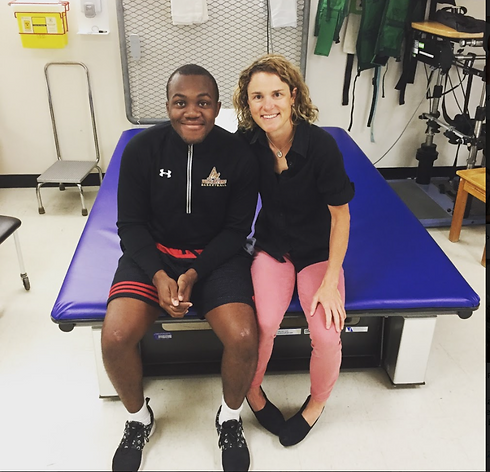MEET
MICHAEL OTOO


HIS STORY
"Growing up in a predominately white suburban neighborhood in Ottawa, it was always easy for me socially. I never had problems making friends, despite being black in a mostly white environment. I was always one of the most popular guys in high school. I was invited to all the parties, captain of my high school basketball team, a city-wide all-star, and one of the best basketball players in the city. In my senior year, I received a basketball scholarship to attend Mount Allison University in New Brunswick and study psychology.
Up until that point, my life had been pretty good. No major challenges or obstacles that I had to overcome. All of this changed on July 1st, 2016 when I was involved in a motor vehicle/pedestrian accident. I was struck by a car, and have no recollection of the most horrific moment of my life. The Glasgow scale is a tool used to describe the level of consciousness in a person following a traumatic brain injury. On this scale of 1-15, scoring a 13-15 shows a mild brain injury. A moderate score is between 9-12. I scored a 3. Scoring a 0 on this scale would have meant I was completely dead.
My first post-accident memory is waking up five days after the incident in the hospital. I remember being confused and wondering “what happened to me?” I did find a lot of comfort that my family and friends were there waiting for me, happy to see me alive. I could not fathom the many obstacles that were awaiting me. I was soon told that my life was never going to be the same. Doctors advised me that due to my severe brain trauma, I might not ever graduate or play basketball again. I knew that my life would be changed forever. I suffered several physical injuries such as a broken rib, lost teeth, a strained calf, and facial injuries.
All of those injuries were manageable at times and I slowly healed physically. The toughest part to manage was how I was affected mentally. Living with a traumatic brain injury is very tough because many people cannot see the daily struggles you have to face. Following the accident, my cognitive skills were poor. I frequently felt down and sad because my life had changed so drastically. I remember the many occasions I spent being in a dark empty room, thinking about how my life had fallen apart and beginning to cry. There were times where I wished the accident had taken my life instead of having to continue to live with the struggles resulting from my severe brain injury.
One day during these tough times, my sister sent me a quote: “you can’t control what happens to you, but you can control how you react to it”. I read that quote once, and it was all I needed to decide I wanted to change my reaction to the entire traumatic situation. I made a choice to no longer feel sorry for myself. To stop searching for answers to the question “why me?”
I was fortunate to have an amazing rehabilitation team following my injuries. The team consisted of a basketball skills coach, strength coach, psychologist, speech pathologist, occupational therapist, physiotherapist, chiropractor, and a nutritionist whom all helped me get back on my feet. I returned to Mount Allison after my year of recovery and played the entire 2017-2018 season. I was very fortunate to be able to make it back to Mount Allison.
Due to a lack of playing time, and the differential treatment afforded to me as a result of my injury, I sought a fresh start. The next season I was able to make a transfer to play at St. Thomas University located in Fredericton, New Brunswick. Through my hard work, I was able to be very successful in my first season there. Despite a severe brain injury, I finished top 20 in league scoring, top 10 in Canada for three-point shooting, and was named a CCR college report Canada all-star for the 2018-2019 season. In the 2019-2020 season, I was national athlete of the week and team defensive player of the year. I still manage my brain injury on a day-to-day basis and suffer from the impairments associated with my trauma.
A big reason I believe in HTGR is that it provides trauma victims the ability to communicate with others who have experienced similar circumstances. Not everyone will have the resources to take on the burdens of rehabilitation to recover from their individual traumas. I love that our team will be helping cover some of the costs associated with getting back to full health for others who need it. It will help create hope for trauma survivors to get back to their best. Let’s help people who deal with trauma and support this wonderful cause!"
- Michael Otoo





